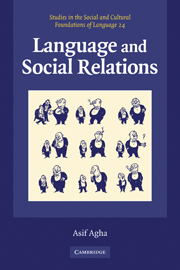Book contents
- Frontmatter
- Contents
- List of figures
- List of tables
- Acknowledgments
- Typographical conventions
- Introduction
- 1 Reflexivity
- 2 From referring to registers
- 3 Register formations
- 4 The social life of cultural value
- 5 Regrouping identity
- 6 Registers of person deixis
- 7 Honorific registers
- 8 Norm and trope in kinship behavior
- Notes
- References
- Index
- STUDIES IN THE SOCIAL AND CULTURAL FOUNDATIONS OF LANGUAGE
4 - The social life of cultural value
Published online by Cambridge University Press: 05 September 2012
- Frontmatter
- Contents
- List of figures
- List of tables
- Acknowledgments
- Typographical conventions
- Introduction
- 1 Reflexivity
- 2 From referring to registers
- 3 Register formations
- 4 The social life of cultural value
- 5 Regrouping identity
- 6 Registers of person deixis
- 7 Honorific registers
- 8 Norm and trope in kinship behavior
- Notes
- References
- Index
- STUDIES IN THE SOCIAL AND CULTURAL FOUNDATIONS OF LANGUAGE
Summary
Introduction
My main concern in this chapter is with processes of linguistic enregisterment, processes through which a linguistic repertoire becomes differentiable within a language as a socially recognized register of forms. The empirical case on which I focus is a particular phonolexical register of Standard British English, nowadays called Received Pronunciation, or RP. I shall be concerned in what follows with the historical processes through which the register emerged as a status emblem in British society and became linked to a distinctive scheme of cultural values. Yet my larger purpose is to draw attention to a series of reflexive social processes – processes of value production, maintenance and transformation – through which a scheme of cultural values has a social life, as it were, a processual and dynamic existence that depends on the activities of social persons linked to each other through discursive interactions and institutions. I argue that cultural value is not a static property of things or people but a precipitate of sociohistorically locatable practices, including discursive practices, which imbue cultural forms with recognizable indexical sign-values and bring these values into circulation along identifiable trajectories in social space. Though the specific objects of value I consider here are linguistic forms, the processes of valorization, circulation and reanalysis I describe are quite general. They apply to – indeed, treat language like – any other cultural form.
- Type
- Chapter
- Information
- Language and Social Relations , pp. 190 - 232Publisher: Cambridge University PressPrint publication year: 2006

